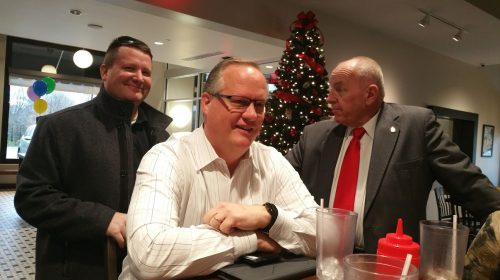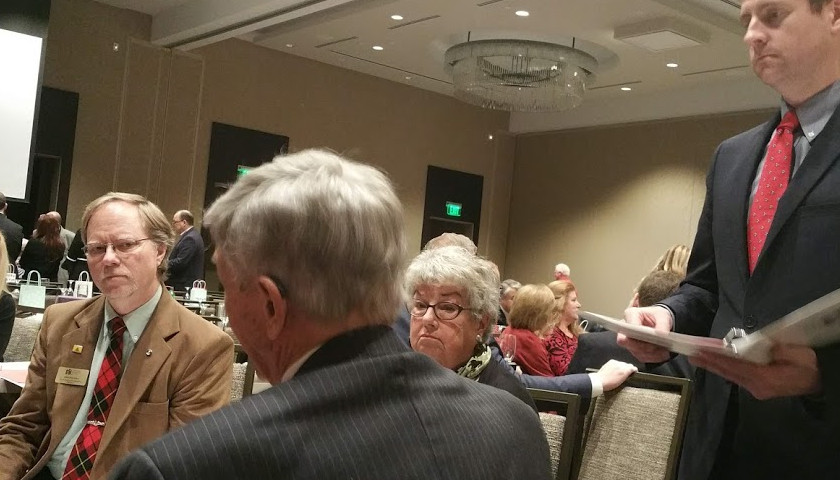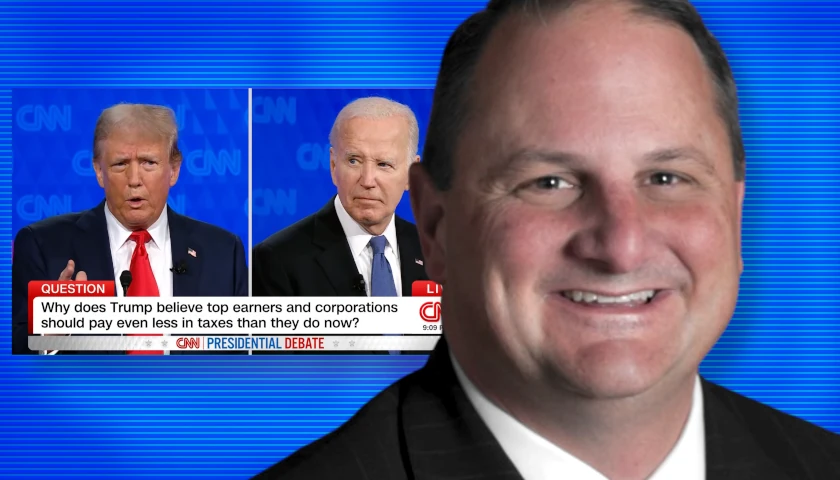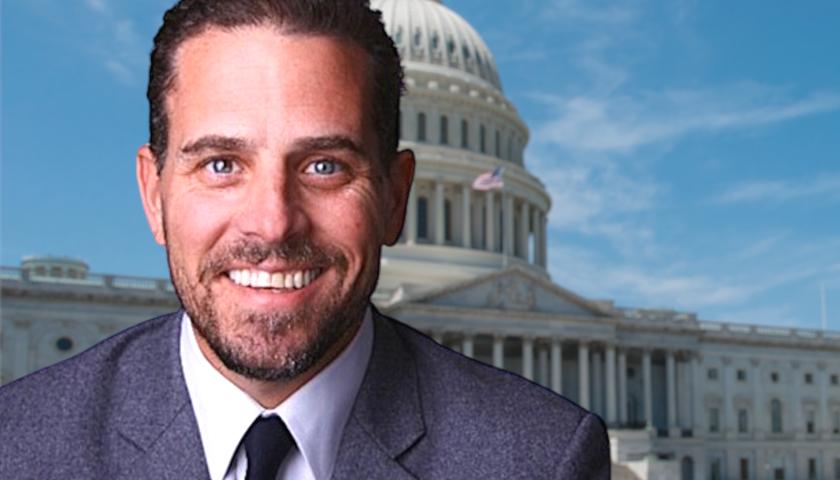FRANKLIN, Tennessee – The State Executive Committee (SEC) of the Tennessee Republican Party voted overwhelmingly at its organizational meeting to require party registration in order to vote in a party’s primary election, more commonly known as closing the primaries.
The SEC has a potential of 66 seats consisting of one committeeman and one committeewoman for each of Tennessee’s 33 Senate districts.
In a roll call vote, there were 45 votes in favor of closing the primaries, 14 for the primaries to remain open and one abstention. Two SEC members were absent with no proxy present, and four seats are currently vacant.
The resolution will be provided to the Tennessee General Assembly with the expectation of getting a bill passed by the Republican-controlled Senate and House to address voter registration during the upcoming legislative session which will begin in January, thereby putting an end to the perceived finger-pointing as to whether it is the SEC or legislature that must close the primaries.
A press release issued shortly after the vote and meeting adjournment on Saturday titled “TNGOP Passes Election Resolutions,” stated that the Tennessee Republican Party’s State Executive Committee voted to approve a resolution that asks the 111th General Assembly “to include a question regarding political party affiliation on Tennessee voter registration forms as well as requiring party registration in order to vote in a party’s primary election.”
Specifically, the resolution passed by the SEC to address Tennessee voter registration deals with two sections of Tennessee Code Annotated (TCA).
The first, TCA 2-2-116, relates to the voter registration form such that it would include a question regarding the political affiliation to a recognized statewide party in order to register to vote.
The second, TCA 2-7-117(b)(1), would specify that an individual must be a registered member of a political party in order to participate in that recognized statewide party’s primary election.
The resolution requesting the 111th Tennessee General Assembly to address the issue of “cross-over” voting in Tennessee’s primary elections introduces the proposed changes to Tennessee’s election laws by stating, “The current process laid out in TCA to prevent individuals who are not bona fide members of a political party does not adequately address the problem.”

While current TCA specifies that a voter be a “bona fide member of and affiliated with the political party in whose primary the voter seeks to vote,” it does not define bona fide and has no practical method for ensuring that the voter is a bona fide member of the political party in which primary they are voting.
The resolution concludes, “Primary elections are set in order for members of a recognized statewide political party to nominate candidates for public office, and therefore these elections should be secured and limited to only registered members of that statewide party.”
An additional resolution addressed offices for which candidates are chosen in primaries so that it would add “County Constitutional Officers” to TCA 2-13-202 which currently lists governor, members of the general assembly, United States senator and members of the United States House of a Representatives for which the statewide political parties shall nominate their candidates.
Specifically, county officers that the Constitution of the State of Tennessee prescribes be elected every four years are a legislative body, county executive, sheriff, trustee, register, county clerk and assessor of property.
As it stands, a recognized political party must call for the nomination of candidates via a primary election 180 days prior to the filing deadline for that office. If there is no established party in that county, it is impossible for a primary for that political party to be called and candidates to run on the political party’s primary ballot.
The consequence of such a change to the law would be that it would eliminate nominating conventions, replaced by primaries statewide.
Prior to the resolutions being voted on by the full body of the SEC, they were discussed by the Communications Committee, one of four committees to which members were assigned by Chairman Scott Golden based on member requests and his assessment as to their skillsets.
In the breakout session of the Communications Committee, state party Executive Director Michael Sullivan reviewed the election resolutions. In discussing the addition of county constitutional officers for automatic inclusion in primaries, he promoted the fact that the state would then bear the cost of primary. Under the current law when primaries are called for, there can be opposition from the local election commissions due to the associated costs, Sullivan advised.
Communications Committee member Angie McClanahan (District 28) requested that, when voted on by the full body, the resolution to close primaries be presented prior to the primary for county constitutional officers.
Newly-elected SEC member Joanne Davis (District 16) recognized she was in the minority of the Communications Committee as she expressed concern for open primaries in the breakout session, saying that most of the cross-over voters in her seven rural counties “are with us” but wouldn’t put it on paper.
Rebecca Griffey (District 24), also a new SEC member representing rural counties, made the case that she ran and won on a platform of closing the primaries.
The Communications Committee as a whole recommended that the resolutions proceed to the full body of the SEC.
As Executive Director Sullivan stepped up to present the Tennessee Voter Registration, or “closed primary” resolution to the full body, he was met with applause as he started with, “This is what you guys have been waiting for.”
Sullivan could have just as well been speaking to the numerous onlookers who were part of a grassroots effort to see this particular resolution to fruition. Organized months ago, several dozen engaged citizens and SEC members launched a comprehensive and concerted effort to close the primaries. The team worked with county party chairs to pass resolutions encouraging their SEC representatives to vote for the measure and contacted SEC members individually to whip votes.
While both would give credit to the team, in large part it was lead by Norman Bobo of Williamson County and Jim Garrett of Davidson County. In what they say could be the first study of its kind, an analysis of voting records for nine state-level elections revealed 14.2 percent of voters voted in at least one Republican and one Democrat primary. While that mixed voting is more than enough to swing many primary elections, the case gets stronger when looking at county level percentages which range from a low of 7.6 percent in Fayette County to the high of nearly 32 percent in Perry County.
While it was obvious as the roll call vote was being taken, the vote tally of 45 to 14 was met with resounding applause by the SEC members and onlookers alike.
When the resolution to add county constitutional officers to the primary came up, which by its nature eliminates nominating conventions, Randy Ellis (District 12) who voted for keeping open primaries, argued against the additional offices to be chosen in primaries. Ellis made his case that the decision should be left to the counties.
Likewise, Rebecca Griffey who disagreed with the resolution for several reasons largely related to the elimination of nominating conventions and their cost-effectiveness, concluded her statements by calling for the issue to be tabled, which ends all discussion and further action.
By voice vote, the SEC membership agreed to table the resolution.
– – –






[…] sponsored by Representative Andy Holt (R-Dresden) under HB 1273, in accordance with a December 2018 overwhelming vote by the State Executive Committee of the Tennessee Republican Party, failed in the same Committee […]
[…] By Laura Baigert | Tennessee Star […]
BRAVO! It’s about time! TN has some of the least transparent, and prone to being manipulated election systems in the USA! No paper trail, No run-off if nobody hit 50%+1, and currently a loose Party affiliation requirement on Primary voting. Personally, I’d like to see Party Caucuses (where the Party picks up the cost, not the State/County), but if we’re going to have Party primaries, at least they should be only for members of that Party! Last I knew, members of the Elks can’t vote in elections held at the Masonic Lodge!
I am totally for runoffs. As an Independent who usually votes Republican and has helped numerous Republicans in two states, I’m just not a member of the party, however. And I don’t like what the GOP did in Maury County recently.
Yeah. I have more problems with the very group closing their taxpayer-funded private political club elections. So what…we pinkie swear, take Honest Abe’s amnesty oath to be allowed to vote in the elections we pay for and then what? Throw all our votes away and give the nomination to Santorum who has zero delegates? Turn Jeb and Rubio commited delegates into Trump delegates? Refuse duly elected open seat delegates? The SEC is dishonest, they move the goalposts as needed. To be a “bonafide” official member, do I have to be willing to cheat like the TNGOP leadership does?
Gonna be more people forced to run as independents.
So 45 people are going to tell the voters of Tennessee what to do? Fat chance of this happening. The SEC has been infiltrated by tea party people and running the state party and local branches in the ground. You people need to enlarge the tent and get past your personal hang ups or you will become even more irrelevant than you are now.
Thank you Laura Baigert for your thorough and well-written article! I’m so glad you highlighted not only the closed primaries victory, but also addressed the very concerning Resolution that was presented yesterday for vote to require primaries for county elections, eliminating County Caucus/Convention as a choice for counties. None of the resolutions brought up for vote yesterday were provided by the TNGOP to any Executive Committee members I know in advance of the meeting. I campaigned for my position on a promise that I would communicate all issues brought up for a vote with the County GOP parties in my district to solicit their positions in order to vote in accordance with the majority of those who put me in office. With the exception of the closed primaries issue, I was unable to do that based on a lack of notice. I am very happy my fellow SEC members supported my motion to table the resolution placing state mandates on how county elections are conducted. In my personal opinion, this decision should be made at the county level by the county party. I believe a caucus/convention offers many benefits over a primary – cost savings to taxpayers, cost savings to candidates, elimination of financial barriers to candidates running, minimizing the financial influence of big donor/PAC money on nominating/electing party candidates, ensuring only bona fide Republicans select candidates to represent the Republican Party in a general election, just to name a few. This year, a number of counties conducted a caucus/convention. To eliminate this freedom of choice by counties is wrong. At the end of the day, in my personal opinion, the choice should be available to counties and made at the county level by those most familiar with the needs/issues/obstacles in the individual county. Additionally, a resolution should not be voted upon by SEC members without input from county parties who will be most impacted by such resolution. Thank you to the SEC members who supported my Motion to table this resolution.
Thanks, Rebecca Griffey. I concur with your reasoning on this issue. I like that you are concerned with the people that you represent and welcome their input. It never hurts to mull over an issue and get all viewpoints.
Very smart move. Here in Texas, our 2018 State Republican Party Platform calls for having closed primaries in Texas. Glad to see that Tennesseeans are already being pro-active in that regard.